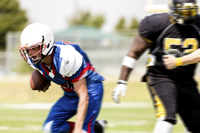While sudden cardiac death is a rare occurrence, it’s shocking when this happens to a young athlete. It happens about 100 times a year in the United States, usually to athletes between the ages of 10 and 19. It often affects not just the family, but the entire community.
Sudden cardiac death in athletes is caused by failure of the heart to pump blood properly during or immediately after exercise, causing the athlete to lose consciousness and ultimately die if normal heart function is not restored quickly.
According to the American Academy of Pediatrics and the American Heart Association, the main causes of sudden cardiac death are loss of proper electrical rhythm of the heart (ventricular fibrillation) and often unknown congenital (present from birth) abnormalities in the heart. The most common of these defects is a thickening of the heart muscle called hypertrophic cardiomyopathy, referred to as HCM. This is generally an inherited abnormality that runs in families and is often undetected until it’s too late.
Additionally, other signs that parents should watch out for include:
- Fainting or seizure during physical activities, or extreme excitement.
- Lightheadedness or dizziness, particularly during activities.
- Heart palpitations, especially during athletic activities.
- Being fatigued and unable to keep up with friends.
As of March 2015, the State of New Jersey has taken proactive steps to help identify and protect student athletes from sudden cardiac death and has developed an assessment module that will supplement the existing cardiac assessment skills of physicians, advanced practice nurses and physician’s assistants who preform student athlete physical exams. The State of New Jersey is leading the nation in this regard as this module appears to be the first of its kind in the country.
Several years ago, New Jersey convened a task force to study this issue after the legislature was approached by a family whose child had died suddenly. The reality is that some of these deaths cannot be anticipated or prevented, but some can. Through better education of both families and clinicians, it may be possible to find the at-risk individuals before a tragedy occurs. Thus, enhanced screening is the key and the module addresses the important issues to supplement and/or refresh clinicians’ knowledge as they certify students for athletic participation.
If you are the parent of a student athlete in the State of New Jersey you probably are aware that New Jersey requires all student athletes to be examined by their medical professional at least once a year before participating in sports. Your medical professional should ask you a series of questions relating to family history, particularly relating to histories of seizure and cardiac arrest in any relatives before age 50.
In addition to regular screening of blood pressure and overall physical health, your physician should screen for heart abnormalities, such as heart murmurs, and rhythm abnormalities. If your Primary Care provider has any concerns they should refer you to a heart specialist, often a pediatric cardiologist who can perform a more comprehensive evaluation. This evaluation may include non-invasive tests such as an electrocardiogram or echocardiogram (ultrasound image of the heart) which can be performed in the office.
For more information and guidelines for the State of New Jersey, please go to this site
http://www.state.nj.us/education/students/safety/health/services/cardiac.pdf

